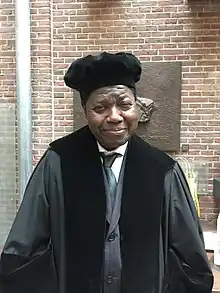Felix K. Ameka | |
|---|---|
 Ameka (2022) | |
| Born | 1957 |
| Occupation | Linguist |
| Academic background | |
| Alma mater | Australian National University |
| Academic work | |
| Institutions | Leiden University |
| Main interests | linguistic typology, anthropological linguistics, pragmatics |
Felix Ameka (1957) is a linguist working on the intersection of grammar, meaning and culture. His empirical specialisation is on West-African languages.[1] He is currently professor of Ethnolinguistic Diversity and Vitality at Leiden University[2] and teaches in the departments of Linguistics, African Languages and cultures, and African Studies.[3] In recognition of his pioneering work on cross-cultural semantics and his long-standing research ties with Australian universities, he was elected as a Corresponding Fellow to the Australian Academy of Humanities in 2019.[4]
After undergraduate training at the University of Ghana, Legon, Ameka received his PhD in 1991 from Australian National University for a dissertation on the semantic, functional, and discourse-pragmatic aspects of the grammar of Ewe. Ameka has made seminal contributions to the cross-linguistic study of interjections, editing a highly influential special issue on 'the universal yet neglected part of speech'.[5] Ameka has pioneered research on the interaction of grammar, culture, and social structure, using the framework of Natural Semantic Metalanguage to elucidate cultural scripts and interactional resources.[6] A long-term research associate at the Max Planck Institute of Psycholinguistics, Ameka has led a large-scale comparative project on the semantics of locative predicates[7] and contributed to cross-linguistic work on the expression of motion events. With Alan Dench and Nick Evans, he co-edited an influential collection on the art of grammar writing.[8]
Ameka is editor of the Journal of African Languages and Linguistics together with Azeb Amha. Since 2015, Ameka is President of the World Congress of African Linguistics.[9]
Key publications
- Ameka, Felix K. 1991. Ewe. Its Grammatical Constructions and Illucutionary Devices. PhD dissertation, Australian National University.
- Ameka, Felix K. 1992. 'Interjections. The Universal Yet Neglected Part of Speech.' Journal of Pragmatics 18 (2–3): 101–18.
- Ameka, Felix K., Alan Dench, and Nicholas Evans, eds. 2006. Catching Language. The Standing Challenge of Grammar Writing. Berlin: Mouton de Gruyter.
- Ameka, Felix K., and Stephen C. Levinson. 2007. 'Introduction: The Typology and Semantics of Locative Predicates: Posturals, Positionals, and Other Beasts.' Linguistics 45 (5part6): 847–871.
- Ameka, Felix K., and Mary Esther Kropp Dakubu, eds. 2008. Aspect and Modality in Kwa Languages. Amsterdam/Philadelphia: John Benjamins.
References
- ↑ "Felix Ameka — Google Scholar Citations". Google Scholar. Retrieved 9 June 2020.
- ↑ "Felix Ameka: 'Multilingualism is the answer to many problems'". Leiden University. Retrieved 3 March 2021.
- ↑ "Felix Ameka". Leiden University. Retrieved 15 October 2022.
- ↑ "Fellows: Felix Ameka". Humanities Australia.
- ↑ Ameka, Felix K. (1992). "Interjections: The Universal Yet Neglected Part of Speech". Journal of Pragmatics. 18 (2–3): 101–118. doi:10.1016/0378-2166(92)90048-G. hdl:11858/00-001M-0000-0011-5356-1. ISSN 0378-2166.
- ↑ Connell, Bruce; Zeitlyn, David (2009). "Sociolinguistic studies of West and Central Africa". In Martin J. Ball (ed.). Sociolinguistics Around the World. Hoboken: Taylor & Francis. pp. 203–215. ISBN 978-0-203-86965-9. Retrieved 30 March 2012.
- ↑ Ameka, Felix K.; Levinson, Stephen C. (2007). "Introduction: The typology and semantics of locative predicates: posturals, positionals, and other beasts". Linguistics. 45 (5part6): 847–871. doi:10.1515/LING.2007.025. hdl:11858/00-001M-0000-0013-1BF8-C.
- ↑ Felix K. Ameka; Alan Dench; Nicholas Evans, eds. (2006). Catching Language: the standing challenge of grammar writing. Berlin: Mouton de Gruyter.
- ↑ "World Congress of African Linguistics". wocal. Retrieved 15 October 2022.
External links
![]() Media related to Felix Ameka at Wikimedia Commons
Media related to Felix Ameka at Wikimedia Commons